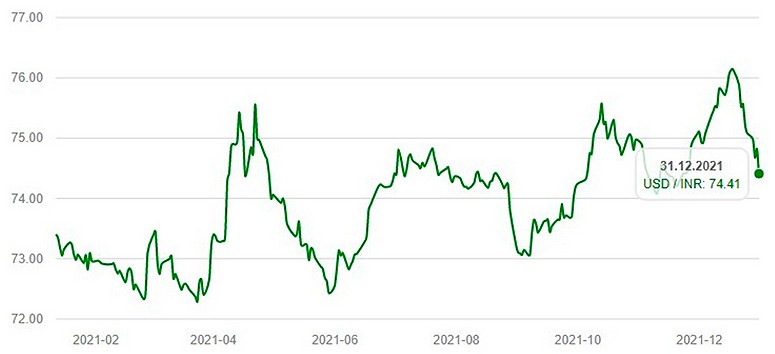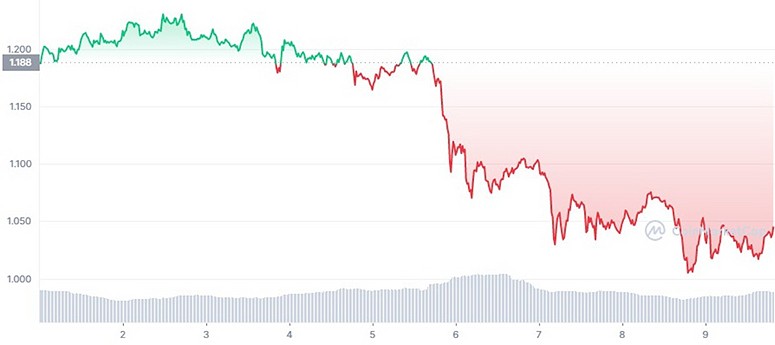States regulate digital assets in different ways. In 2021, the legal status of cryptocurrencies in India remained uncertain. While some states actively traded koins, others banned their use. Contrary to this unevenness, the number of crypto-enthusiasts in the country has been steadily increasing. According to Broker Chooser, more than 100 million citizens have invested in the new asset class at the end of 2021 – more than anywhere else in the world. The demand for digital coins has turned India into one of the fastest growing cryptocurrency markets. The leadership has been driven by a lot of activity on decentralized funding platforms.
The popularity of cryptocurrency in India
Blockchain and digital coins are fundamentally changing the financial structure of nations. According to the World Bank, India is among the top 10 largest economies in the world in 2022. The country’s GDP is $2.94 trillion. However, nearly 190 million Indians do not have access to banking services due to infrastructure issues or lack of documents to open an account.
Most of these people use smartphones and go online. They can easily pay for purchases with cryptocurrency. But the authorities still have a lot of work to do before digital money is recognized as a legal means of payment. For now, cryptocurrency is being used for other purposes in India:
- Cross-border money transfers. For several years, India has remained the world’s largest out-migration country (about 17 million people per year). Migrants create a large demand for remittances. Inbound transactions totaled $83 billion in 2021. Cryptocurrency remittances cost less (about $0.02 instead of the standard $6.82) and are faster.
- Inflation protection. In 2020-2021, the exchange rate between the Indian rupee and the dollar rose, which led to the depreciation of the national currency. At the same time, trading of digital coins on crypto exchanges increased. Many Indians realized that bitcoin could be a more reliable asset than paper bills.
- Investment tool. According to Chainalysis, Indians will invest nearly $40 billion in cryptocurrencies in 2021. That’s 200 times more than in 2020 ($200 million). Most of the Indian investors are residents of large and medium-sized cities who invest in digital assets to earn extra income.

Features of regulation
In 2018, the Reserve Bank of India (RBI) issued a circular prohibiting financial organizations from serving companies related to digital currencies. After that, local cryptocurrency exchanges began to shut down.
In 2020, the country’s Supreme Court lifted the ban on digital coin transactions. This triggered an explosion of trading on cryptocurrency exchanges. In 2021, the number of registrations on India’s largest platform WazirX increased by 2648%. In total, the trading volume on the country’s top four platforms grew from $10.6 million to $102 million.
5020 $
bonus pentru utilizatorii noi!
ByBit oferă condiții convenabile și sigure pentru tranzacționarea criptomonedelor, oferă comisioane mici, un nivel ridicat de lichiditate și instrumente moderne pentru analiza pieței. Suportă tranzacționarea spot și cu efect de levier și ajută comercianții începători și profesioniști cu o interfață intuitivă și tutoriale.
Câștigați un bonus de 100 $
pentru utilizatorii noi!
Cea mai mare bursă de criptomonede unde vă puteți începe rapid și în siguranță călătoria în lumea criptomonedelor. Platforma oferă sute de active populare, comisioane mici și instrumente avansate pentru tranzacționare și investiții. Înregistrarea ușoară, viteza mare a tranzacțiilor și protecția fiabilă a fondurilor fac din Binance o alegere excelentă pentru comercianții de orice nivel!
In 2021, the Indian authorities were actively engaged in the regulation of cryptocurrencies. In December, the government prepared a bill that would oblige Indians to disclose information about their digital assets and transfer them to regulated platforms. As part of the fight against money laundering, all anonymous transactions and non-custodial wallets will be banned. Cryptocurrencies will be equated to assets in India. Transaction income will be brought into the taxable base.
How to buy cryptocurrency
While Indians are waiting for the establishment of clear rules for trading digital coins, a large number of new platforms are entering the market. The largest crypto exchanges (WazirX, CoinDCX, Bitbns, ZebPay) offer a standard set of features:
- Buying, selling, exchanging some coins for other coins, as well as for rupees.
- Criptomonedăpichetare.
- Mining of BTC and altcoins.
- Cryptocurrency loans.
To trade on these platforms, you need to be verified. To work with a fiat account (INR), you will need to link a bank account or deposit money through the Loop peer-to-peer service.
| Schimb | Average daily trading volume in January 2022 ($) | Weekly visits in January 2022 (people) | Number of coins listed (pcs.) |
|---|---|---|---|
| WazirX | 61.55 million | 2.84 million | 226 |
| CoinDCX | 36.25 mln | 698.12 th. | 270 |
| Bitbns | 27.86 mln | 186.4 thou. | 136 |
| ZebPay | 8,05 mln | 55,28 th. | 51 |
For those who prefer anonymous transactions, the Indian crypto market offers schimburi descentralizate (Curve Finance, Uniswap) and P2P platforms (LokalBitcoins, Paxful). The latter act as a bridge between sellers and buyers of koins and convert fiat rupees into digital coins.

India’s national cryptocurrency
In November 2021, RBI proposed that parliamentarians consider an initiative to launch a digital rupee. The national cryptocurrency (CBDC) pilot project is scheduled to start in the first quarter of 2022. For now, the CBDC is working out certain aspects of its implementation. In particular, financiers are deciding whether the technology should be decentralized or semi-regulated. The initiative is proposed within the framework of the bill on cryptocurrencies, which will be considered by Parliament in the current session.
The government first talked about launching the currency in 2018. At that time, the RBI announced its intention to reduce the cost of making cash (about Rs 90 million per year).
In 2020, the National Institute of Smart Governance (NISG) presented for discussion a project for the development of blockchain technology in the country. The document envisioned the creation of one of the leading innovation ecosystems in India. It was envisioned that by 2025, blockchain and cryptocurrency technologies would be implemented in all government sectors. The researchers identified the release of CBDC as one of the central conditions for the strategy.
In January 2022, RBI formed a fintech task force department to draft crypto regulations and government digital currency. The department has been headed by RBI executive director Ajay Kumar Choudhary. Local experts believe that this is a good sign that could lead to an accelerated piloting of CBDC.
Popular projects
According to Chainalysis, 59% of cryptocurrency transactions in 2021 by Indians were made in the DeFi sector. According to Ashish Singhal, CEO of exchange CoinSwitch, users perceive decentralized jetoane as a high-yielding investment. For example, in August, the platform added several DeFi coins to its listing. On the first day, local traders invested $1 million in them. The following month, trading volume grew to $10 million.
The country’s largest crypto exchange WazirX also noted a significant demand for tokens of decentralized applications. In 2021, the daily sales volume of DeFi tokens amounted to almost $3 million (25% of the total turnover). ZebPay, the oldest exchange, named BTC, SHIB and MATIC as the most traded assets. WazirX also mentioned DOGE.
Outlook for the crypto industry in India
Uncertainty in regulation does not prevent the creation of new startups. In January 2022, there are 380 cryptocurrency companies operating in the country. Of these, 27 are “unicorns” with a capitalizarea de more than $1 billion. Analysts of the association of developers NASSCOM predict exponential growth of the local crypto market in the next 10 years. According to experts’ calculations, in 2026 the digital currency industry in India will reach $2.6 billion, by 2030 – $241 billion.
NASSCOM notes: 60% of states are already turning into cryptohubs. More than 15 million Indians are actively trading BTC and other coins. Taking into account the trend, India will be able to create 800 thousand new jobs by 2023. The industry also has the potential to generate $184 billion in economic value-added in the form of investments.
Rezumat
According to Coinpaprika and OKEx analysts, the driving force behind the development of the Indian cryptocurrency market is formed by migrants, the volatility of the national currency and government policies. In 2021, the country was among the leaders in terms of industry growth. Experts expect the share of cryptocurrency transactions of Indians in the global market to increase significantly in 2024. This will be facilitated by the adoption of new regulatory legislation and the launch of the virtual rupee.
Întrebări frecvente
❓ Where can I buy Bitcoin in Delhi?
The most popular crypto exchanges in the country are WazirX, CoinDCX, and Bitbns. You can also buy coins on DeFi and P2P platforms.
🔑 What is the status of crypto coins in India?
Virtual currencies are equated to assets in the country. They can be bought, sold, exchanged, pledged. But they cannot be used as a means of payment.
💰 Do Indians pay tax for mining digital coins?
In 2022, cryptocurrency legislation is in the pipeline. The current rules do not provide for taxation of transactions with BTC and altcoins. The new bill has such a clause.
💡 Can a foreigner buy bitcoin on Indian exchanges?
The country’s largest trading platforms operate in an international format. WazirX, CoinDCX and other exchanges are Indian-centric but also cater to foreign traders.
⏱ When will the digital rupee be launched?
RBI plans to launch the project in the first quarter of 2022.
Există o greșeală în text? Evidențiați-o cu mouse-ul și apăsați Ctrl + Introduceți
Autor: Saifedean Ammous, un expert în economia criptomonedelor.















